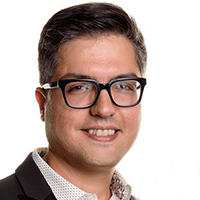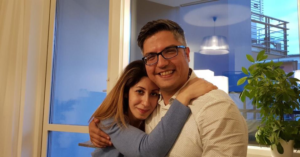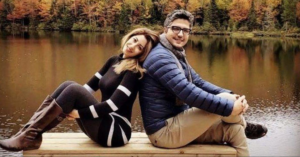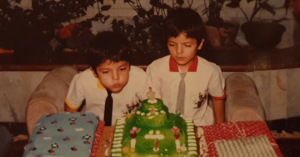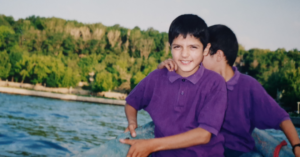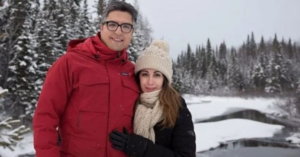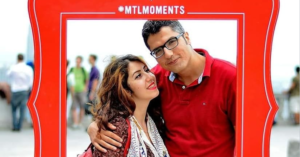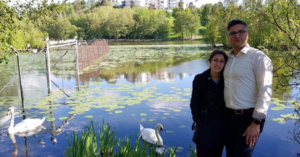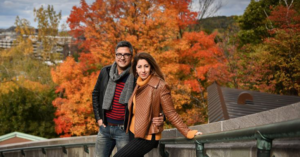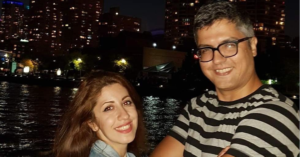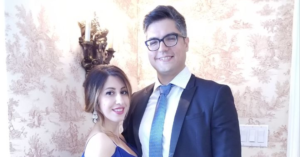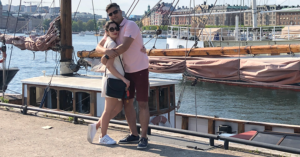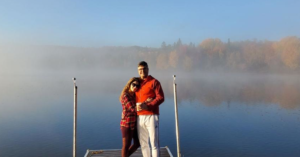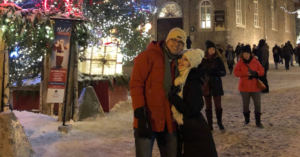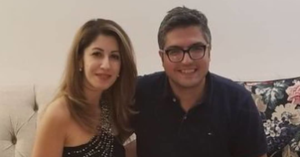Arvin Morattab
Arvin, my Lost Half
We were identical twins. Our hearts beat together. We were the same height, had the same face. We laughed the same. When we were kids, we wanted the same things together. As we grew up in the same city, living in the same city, we followed our dreams together. I don’t ever remember us crying together.
Arvin and I were born on August 1, 1984 in Sanandaj, in the days of war, the days of running to shelters and of red alerts. I was born five minutes before Arvin and that made me the elder brother. We always laughed about this five-minute age difference. I sometimes joked with him: “Don’t you forget, I’m your older brother! Even if only by five minutes. That’s a whole 300 seconds.”
The five minutes would become a nightmare. Not that five minutes, but the five minutes Arvin and his wife, Aida, spent in the air.
Our father is a hydraulics engineer and worked in Kurdistan’s water department, making and supervising dams. Our mother worked in Sanandaj’s health sector. We were three brothers: Armin, Arvin and Arash. The middle piece of the puzzle has now been lost, just like one of the last pictures we took together. Arvin and Aida are standing in the middle, in the heart of the crowd. Now, that space is a vacuum. The thread that connected us has been torn and our hearts are dark with remorse.
He was an elite student. We were at school together since kindergarten, through pre-school, primary school, middle school, high school and pre-college, and all at the Tizhooshan: a school for the bright kids. We marched forward together but had to separate for college. I got into Tehran’s K.N. Toosi University of Technology and Arvin went to Tabriz University. We both studied electronics: I the communications side, he the control. We visited one another from time to time. Our friends mistook us for each other and this meant we quickly found new friends. It felt like we had known them for a long time.
We got together again for our master’s degrees, both in Tehran. But I remained at K. N. Toosi and Arvin went to Iran University of Science and Technology. Arvin spoke four languages fluently: Kurdish, Persian, English and French. When Aida and I spoke in French, he’d correct us. “That’s enough, Napoleon!” we told him.
Sometimes he sang, and played guitar or the Divan. When love came, he’d sing a song by Dariush. “Love is like the flight of a bird…”
He was good at football, good at running, quicker than me and better at cycling. He loved to climb mountains, to ski and to hike. He loved traveling into the heart of nature and staying there for days and nights on end. He loved being a friend of the mountains, of the forests, of the jungles. How far, how far he was from these worlds, when he bade farewell to life. He might well have preferred facing down a hungry wolf. He might well have preferred fighting an armed division, eye to eye, to sitting quietly in his seat as the plane shook on being hit by missiles…
Arvin always kept up with news from Iran and the Middle East. The suffering of Kolbars, of teachers, of workers, of a land that was burning, of a Middle East where the interplay of politics and superpowers left no room for life, happiness and progress! He didn’t know that the fire would engulf him too, would engulf all of us; that same fire that in the bitter summer of 2009 had taken from us Arvin’s roommate, Kianoosh Asa. Arvin had written a poem for him:
I can hear the tanbur
Amid the bullets that target the hearts of our youth.
I can hear the tanbur from afar
But it is so loud it breaks down alltheir knives and batons
I can hear the tanbur
As it joins the clamor of thousands of wounded lives,
As it strikes their ranks like a mighty wave
I can hear the tanbur
From the heavens, from the sun, from the end of history
Can you see our youth dancing in their own blood?
Can you see a single finger silencing them?
Their only crime is that they spoke of freedom.
I can hear the tanbur
Louder than time
Like a lighting bolt dividing the sea
***
The heavens rain blood
Somewhere far, beyond the sun
Kianoosh is standing over this red soil
With a tanbur in hand
Playing it hard, in rage, in love
His fingers bleed.
Is he calling on the world to join the fight against darkness?
***
Kianoosh is sleeping quietly under the earth.
And his mother, his sister, are crying over his grave
But still,
From every corner of the city,
From heavens and from the earth,
From the alleyways, from the rooftops,
I can hear the tanbur,
I can hear the tanbur,
I can hear the tanbur.
Arvin fell in love before I did. He loved a beautiful girl called Aida who lived in Sweden. She had come to Iran with her sister to see their family. One evening, we joined a mutual friend at a cafe in the mountains of Abidar. They met each other there, and fell in love. They kept in touch remotely and whenever Aida visited Iran, they saw each other. Love took them to Montreal. Arvin had an offer from West Virginia University in the US, but he chose Canada to improve his prospects, for himself and for the love of his life. A few months after Arvin and I got to Canada, Aida picked Montreal too and our family was all the more complete. Arash joined us the year after. Arvin and Aida got married in 2011. We all studied at the same university.
Arvin also worked. He got a PhD in power network control and started working in well-known companies such as OpalRT and Eaton. Many of his articles were presented in international conferences or published in credible journals.
Arvin and Aida came back to Iran after spending a few years abroad. They wanted to spend 18 days at home. We were in touch until the very moment they started the trip back to Montreal. For Arash and I, as we were following the news from Canada, these were difficult and stressful moments. When Arvin and Aida were at the airport we told them there was a possibility of war, that it could break out any moment. They should seek shelter. But they still came. They, like 174 other people. In the airport, everything looked normal. All the flights were on time.
Telepathy with the dead is not possible for me, his twin brother. Beyond this wall, I can’t find a way to my lost half. I have to stand in front of the mirror and ask what happened to him, Aida and others. I want to know what he went through in his last moments, to know what happened in that plane. For my parents, it is hard to face me. In me, they see Arvin, they hear Arvin. The way he laughs, the way his hair falls on his face. Even for me, it is hard to see me. I am reminded of a lost half.
Arvin was funnier than me. He laughed more, he was more careless. I was the serious one. Now I have to be both of us. I spoke earlier of the many times we laughed together. I never remember us crying together. I will now laugh for him and cry for him. I don’t know when it will be the time to laugh, but it’s always time to cry. Crying for a boy who was five minutes younger than me. Five beautiful minutes, turned to ashes.
Writer: Armin Morattab, Arvin’s Brother
Translator: Arash Azizi
Editor: Hannah Somerville
With the support of iranwire.com
